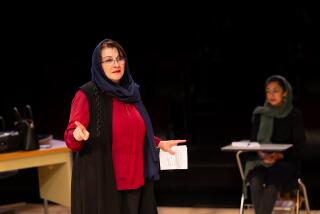TV REVIEW : RICH EXCURSION IN ‘STORY OF ENGLISH’
- Share via
What do teen-age girls at the Sherman Oaks Galleria have in common with rock musicians in the Soviet Union, the ex-president of Sierra Leone and the prime minister of Singapore?
They all speak English. As a result, they all turn up in the opening installment of “The Story of English,” the first major public television series of the season, in which Robert MacNeil takes viewers on a rich excursion into the history and varieties of the English language.
The nine-part series premieres on KCET Channel 28 Sunday at 10 p.m. It got under way earlier in the week on Channels 50, 15 and 24 and will continue to be seen on those stations Mondays at 10 p.m.
This is unusual television--a series in which watching is less important than listening, and in which listening to what’s being said in interviews is frequently less important than to the way it’s being said--the accent and pronunciations.
It takes some adjusting, but once you get acclimated, you’re in for a treat. For the language that most Americans take for granted as just so many words is presented as a virtual life force of its own--whose genealogy encompasses major historical events and a fascinating diversity of cultural and geographic factors, whose evolution has taken an incredible array of forms and whose present state is constantly expanding and changing.
MacNeil, who wrote the series with Robert McCrum and whose MacNeil-Lehrer Productions co-produced it with the BBC, wisely begins in the present, taking viewers to Europe, Africa, India, the Orient and even California to demonstrate how English has become “more influential than any language the world has ever known.”
It is spoken by perhaps as many as 1 billion people a day, he says, and has become the international language of business and of science.
The second episode begins the history of the language, tracing its growth from its roots in a small, violent tribe in Europe to the works of its first great writer, Geoffrey Chaucer. Along the way MacNeil provides a quite sensible explanation of why spelling in the English language is so frustratingly erratic.
The third installment pays tribute to William Shakespeare as perhaps the greatest master of the English language and certainly its most influential practitioner, with scenes from some of his plays included to make the point. It then examines the spread of the language to the New World.
More to Read
The complete guide to home viewing
Get Screen Gab for everything about the TV shows and streaming movies everyone’s talking about.
You may occasionally receive promotional content from the Los Angeles Times.






